
Journal Menu
► ▼ Journal Menu-
- Atmosphere Home
- Aims & Scope
- Editorial Board
- Reviewer Board
- Topical Advisory Panel
- Instructions for Authors
- Special Issues
- Topics
- Sections & Collections
- Article Processing Charge
- Indexing & Archiving
- Editor’s Choice Articles
- Most Cited & Viewed
- Journal Statistics
- Journal History
- Journal Awards
- Society Collaborations
- Conferences
- Editorial Office
Journal Browser
► ▼ Journal BrowserNeed Help?
Announcements
9 June 2022
2021 CiteScores - Released
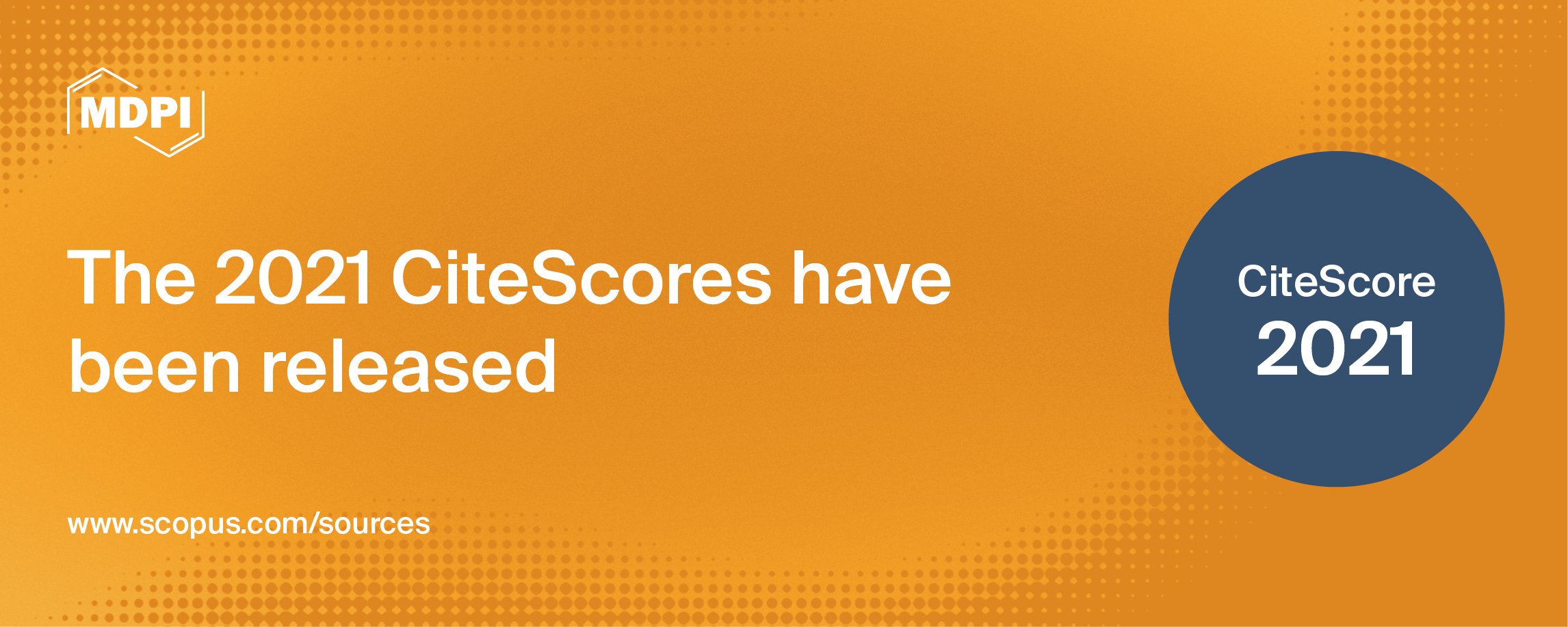
The 2021 citation metrics have been officially released in Scopus!
We are pleased to announce that 182 MDPI journals are included, of which:
● 21 journals received their first CiteScore.
● 85% of journals increased their CiteScore from 2020.
● 155 journals (85%) ranked above average, in at least one category.
The following 65 MDPI journals (36%) ranked among the top 25% of journals, in at least one category:
|
Journal |
CiteScore |
Quartile |
Category |
|
10.1 |
Q1 |
Genetics |
|
|
10.0 |
Q1 |
Biomedical Engineering |
|
|
8.1 |
Q1 |
Pharmacology, Toxicology and Pharmaceutics (miscellaneous) |
|
|
7.9 |
Q1 |
Electrical and Electronic Engineering |
|
|
7.9 |
Q1 |
Nutrition and Dietetics |
|
|
7.4 |
Q1 |
General Earth and Planetary Sciences |
|
|
7.2 |
Q1 |
Computer Science Applications |
|
|
6.9 |
Q1 |
Inorganic Chemistry |
|
|
6.9 |
Q1 |
Computer Networks and Communications |
|
|
6.7 |
Q1 |
General Biochemistry, Genetics and Molecular Biology |
|
|
6.6 |
Q1 |
General Chemical Engineering |
|
|
6.6 |
Q1 |
Health, Toxicology and Mutagenesis |
|
|
6.6 |
Q1 |
Infectious Diseases |
|
|
6.5 |
Q1 |
Food Science |
|
|
6.5 |
Q1 |
Civil and Structural Engineering |
|
|
6.4 |
Q1 |
Nature and Landscape Conservation |
|
|
6.4 |
Q1 |
Instrumentation |
|
|
6.1 |
Q1 |
Management Information Systems |
|
|
5.9 |
Q1 |
Chemistry (miscellaneous) |
|
|
5.7 |
Q1 |
Polymers and Plastics |
|
|
5.6 |
Q1 |
Engineering (miscellaneous) |
|
|
5.5 |
Q1 |
General Environmental Science |
|
|
5.5 |
Q1 |
Urban Studies |
|
|
5.4 |
Q2 |
Computer Networks and Communications |
|
|
5.3 |
Q1 |
Food Science |
|
|
5.3 |
Q1 |
Plant Science |
|
|
5.2 |
Q1 |
Ecology, Evolution, Behavior and Systematics |
|
|
5.2 |
Q1 |
General Engineering |
|
|
Journal of Open Innovation: Technology, Market, and Complexity |
5.1 |
Q1 |
Development |
|
5.0 |
Q1 |
Chemistry (miscellaneous) |
|
|
5.0 |
Q1 |
Control and Optimization |
|
|
5.0 |
Q1 |
Geography, Planning and Development |
|
|
5.0 |
Q1 |
Geography, Planning and Development |
|
|
4.9 |
Q1 |
Forestry |
|
|
4.9 |
Q1 |
Control and Optimization |
|
|
4.9 |
Q1 |
Soil Science |
|
|
4.8 |
Q1 |
General Earth and Planetary Sciences |
|
|
4.8 |
Q1 |
Mechanical Engineering |
|
|
4.8 |
Q1 |
Public Health, Environmental and Occupational Health |
|
|
4.8 |
Q1 |
Geography, Planning and Development |
|
|
International Journal of Environmental Research and Public Health |
4.5 |
Q1 |
Public Health, Environmental and Occupational Health |
|
4.5 |
Q1 |
Physical Therapy, Sports Therapy and Rehabilitation |
|
|
4.4 |
Q1 |
Mathematical Physics |
|
|
4.4 |
Q1 |
General Medicine |
|
|
4.3 |
Q1 |
General Mathematics |
|
|
4.2 |
Q1 |
Surgery |
|
|
4.1 |
Q1 |
Health Professions (miscellaneous) |
|
|
4.1 |
Q1 |
Plant Science |
|
|
4.0 |
Q1 |
General Engineering |
|
|
4.0 |
Q1 |
Forestry |
|
|
4.0 |
Q1 |
Education |
|
|
3.9 |
Q1 |
General Pharmacology, Toxicology and Pharmaceutics |
|
|
3.9 |
Q1 |
Applied Mathematics |
|
|
3.8 |
Q1 |
Development |
|
|
3.8 |
Q1 |
Architecture |
|
|
3.8 |
Q1 |
Metals and Alloys |
|
|
3.5 |
Q1 |
Communication |
|
|
3.4 |
Q1 |
General Social Sciences |
|
|
2.9 |
Q1 |
General Mathematics |
|
|
2.8 |
Q1 |
Analysis |
|
|
2.7 |
Q1 |
General Veterinary |
|
|
2.6 |
Q1 |
Algebra and Number Theory |
|
|
1.8 |
Q1 |
Conservation |
|
|
1.0 |
Q1 |
Religious Studies |
|
|
0.9 |
Q1 |
Philosophy |
Source: 2021 CiteScores™ (Elsevier)
20 May 2022
Prof. Dr. Ilias Kavouras Appointed Editor-in-Chief of Atmosphere

We are pleased to announce that Prof. Dr. Ilias Kavouras has been appointed Editor-in-Chief of Atmosphere (IF: 2.686, ISSN 2073-4433, https://www.mdpi.com/journal/atmosphere).
Prof. Dr. Ilias Kavouras is a Professor of Environmental Health Sciences at CUNY Graduate School of Public Health and Health Policy in New York City. He is trained as a chemist and an environmental health scientist. His research integrates natural and health sciences to understand atmospheric dynamics, from the release of contaminants, their fate in the atmosphere and the role of physical and chemical processes to exposure pathways and their relationship with biological mechanisms of toxicity and clinical outcomes. He is particularly interested in the interplay of climate change with atmospheric physical and chemical processes and the resultant environmental and health impacts.
Prof. Dr. Kavouras has been affiliated with research and academic institutes in the US and abroad, working on the aforementioned big-picture topics to address local and regional priorities while considering their diverse and unique characteristics. His experimental study designs include benchtop laboratory analysis and in vitro toxicology, methods development, field studies, community-based exposure and health studies, and integrated geospatial, inverse, and epidemiological modeling.
The following is a short Q&A with Prof. Dr. Ilias Kavouras, who shared his vision for the journal as well as his views on this research area:
- What appealed to you about the journal and made you want to take the role as its Editor-in-Chief?
I am honored to serve the journal, Editorial Board, authors, and readers as the Editor-in-Chief of Atmosphere. Earth’s atmosphere is the single most important factor for the development and evolution of life on the planet. There is reciprocal and evolving interaction with both the natural and human ecosystems. An increasing number of scientists across many disciplines, from natural sciences to engineering, health, and social sciences are tackling the multifaceted mechanisms and impacts of atmospheric processes using state-of-the-art tools, technologies and methodological frameworks. Under the leadership of Dr. Aiken and the Editorial Board, the journal provides a forum for discipline-specific as well as interdisciplinary research, and facilitates the exchange of ideas and cross-pollination required to meet the scientific and societal challenges of a changing climate. It holds great potential to advance science and innovation on many different levels.
- What is your vision for the journal?
It is my primary goal to continue and strengthen the journal’s prominence in atmospheric sciences as a forum of high-quality–high-impact, accessible research on fundamental atmospheric disciplines. Building on existing broader themes, it is also in the interests of the journal, the scientific community, and society to expand to atmosphere-driven transdisciplinary basic and applied research. The journal already has scientifically and geographically diverse editors, Advisory Panel Members and Editorial Board Members, but we are lacking in gender and racial diversity. It will be a priority for the editorial team, in consultation with the Advisory and Editorial Board, to further expand expertise, diversity, equity, and inclusion. This is also true for authors and readers. Creating pathways to increase diversity, accessibility, and inclusion of authors, reviewers, and readers from underrepresented and underserved groups is key to the mission and vision of the journal. Social media and interactive platforms of engagement will be integrated to engage a broader network of scientists, professionals, and policymakers across disciplines.
- What does the future of this field of research look like?
It is a great time to be working in atmospheric sciences today. There have been many breakthroughs in atmospheric sciences over the past few decades, but many more have yet to be discovered. As a result, there are many opportunities moving forward for fundamental processes, direct and indirect impacts on natural and human environments, and research-to-practice studies, covering subjects from climate change to atmospheric dynamics and chemistry, from droughts and wildfires to man-made emissions, from measurements to modeling, from mechanisms to policy and strategies. Due to recent advancements, we can obtain measurements, run simulations, and analyze big data more precisely and efficiently than in the not-so-distant past, allowing us to provide more detail, refine existing knowledge, and test new hypotheses and concepts.
- What do you think of the development of Open Access in the publishing field?
Accessibility is key to advancing diversity, equity, and inclusion in science and research. The Open Access model resolves the shortcomings of traditional publishing models by enabling access to published research and studies. Many funding agencies now support the open access of publications through sponsored research. However, funding priorities and disparities pose a challenge in the implementation of the Open Access model, particularly from low- and middle-income regions. I will work with the editorial team to develop initiatives that improve inclusion. The type, character, impact, and size of basic and applied atmospheric research published in the journal are growing. Embedding open and fair data practices is beneficial to the scientific community as well as the publication process. It adds value and content, which is consistent with the Open Access publication model, and further utilizes the strengths of technology to communicate scientific outputs and outcomes.
15 February 2022
Atmosphere | Highly Cited Papers in Science Citation Index Expanded (SCIE) in Web of Science, 2020–2021
It is our great honor to congratulate the publications that have been distinguished as highly cited papers by Clarivate in 2020–2021, according to the Web of Science data. As of September/October 2021, these highly cited papers received enough citations to place them in the top 1% of the academic field of geosciences, based on a high citation threshold for the field and the publication year analyzed in the "Essential Science Indicators", distinguishing them as hugely influential within their research area.
“Modeling Pan Evaporation Using Gaussian Process Regression K-Nearest Neighbors Random Forest and Support Vector Machines; Comparative Analysis”
Shabani, S.; Samadianfard, S.; Sattari, M.T.; Mosavi, A.; Shamshirband, S.; Kmet, T.; Várkonyi-Kóczy, A.R.
Available online: https://www.mdpi.com/2073-4433/11/1/66
“COVID-19 and Air Pollution: Measuring Pandemic Impact to Air Quality in Five European Countries”
Skirienė, A.F.; Stasiškienė, Ž.
Available online: https://www.mdpi.com/2073-4433/12/3/290
“Temporal Changes in Ozone Concentrations and Their Impact on Vegetation”
Juráň, S.; Grace, J.; Urban, O.
Available online: https://www.mdpi.com/2073-4433/12/1/82
“Spectral Analysis of Gravity Waves from Near Space High-Resolution Balloon Data in Northwest China”
He, Y.; Sheng, Z.; He, M.
Available online: https://www.mdpi.com/2073-4433/11/2/133
“Quantifying the Impact of the COVID-19 Lockdown Measures on Nitrogen Dioxide Levels throughout Europe”
Solberg, S.; Walker, S.-E.; Schneider, P.; Guerreiro, C.
Available online: https://www.mdpi.com/2073-4433/12/2/131
“Regional Scale Impact of the COVID-19 Lockdown on Air Quality: Gaseous Pollutants in the Po Valley, Northern Italy”
Lonati, G.; Riva, F.
Available online: https://www.mdpi.com/2073-4433/12/2/264
“NOx Emission Reduction and Recovery during COVID-19 in East China”
Zhang, R.; Zhang, Y.; Lin, H.; Feng, X.; Fu, T.-M.; Wang, Y.
Available online: https://www.mdpi.com/2073-4433/11/4/433
15 February 2022
Atmosphere | Publications from Academicians in 2020–2021
We are pleased to highlight several papers from academicians that have been published in Atmosphere (ISSN: 2073-4433) over the last two years. We invite you to read the selection of these papers, which are listed below.
“Characterization of Urban New Particle Formation in Amman—Jordan”
Markku Kulmala (马库·库马拉)
Available online: https://www.mdpi.com/2073-4433/11/1/79
“Changes in Tropical-Cyclone Translation Speed over the Western North Pacific”
Dake Chen (陈大可)
Available online: https://www.mdpi.com/2073-4433/11/1/93
“Evaluation of the Performance of Low-Cost Air Quality Sensors at a High Mountain Station with Complex Meteorological Conditions”
Wenxing Wang (王文兴)
Available online: https://www.mdpi.com/2073-4433/11/2/212
“WRF-Chem Simulation of Winter Visibility in Jiangsu, China, and the Application of a Neural Network Algorithm”
Huijun Wang (王会军)
Available online: https://www.mdpi.com/2073-4433/11/5/520
“Interdecadal Change in the Relationship between Northern and Southern Hemisphere Meridional Circulation over the Western Pacific Ocean”
Huijun Wang (王会军)
Available online: https://www.mdpi.com/2073-4433/11/10/1106
“Interdecadal Variations in Extreme High–Temperature Events over Southern China in the Early 2000s and the Influence of the Pacific Decadal Oscillation”
Huijun Wang (王会军)
Available online: https://www.mdpi.com/2073-4433/11/8/829
“Aerosol Effective Radiative Forcing in the Online Aerosol Coupled CAS-FGOALS-f3-L Climate Model”
Guangyu Shi (石广玉)
Available online: https://www.mdpi.com/2073-4433/11/10/1115
“Comparison of CMIP5 and CMIP6 Multi-Model Ensemble for Precipitation Downscaling Results and Observational Data: The Case of Hanjiang River Basin”
Hao Wang (王浩)
Available online: https://www.mdpi.com/2073-4433/12/7/867
“Data Assimilation of Ambient Concentrations of Multiple Air Pollutants Using an Emission-Concentration Response Modeling Framework”
Jiming Hao (郝吉明)
Available online: https://www.mdpi.com/2073-4433/11/12/1289
“Oxygen Isotopes in Tree Rings from Greenland: A New Proxy of NAO”
Zhengtang Guo (郭正堂)
Available online: https://www.mdpi.com/2073-4433/12/1/39
“Tropospheric NO2 Pollution Monitoring with the GF-5 Satellite Environmental Trace Gases Monitoring Instrument over the North China Plain during Winter 2018–2019”
Wenqing Liu (刘文清)
Available online: https://www.mdpi.com/2073-4433/12/3/398
“Downscaling of Future Precipitation in China’s Beijing-Tianjin-Hebei Region Using a Weather Generator”
Deliang Chen (陈德亮)
Available online: https://www.mdpi.com/2073-4433/13/1/22
11 February 2022
Meet Us Online at the 4th International Electronic Conference on Environmental Research and Public Health (ECERPH 2022), 15–30 October 2022
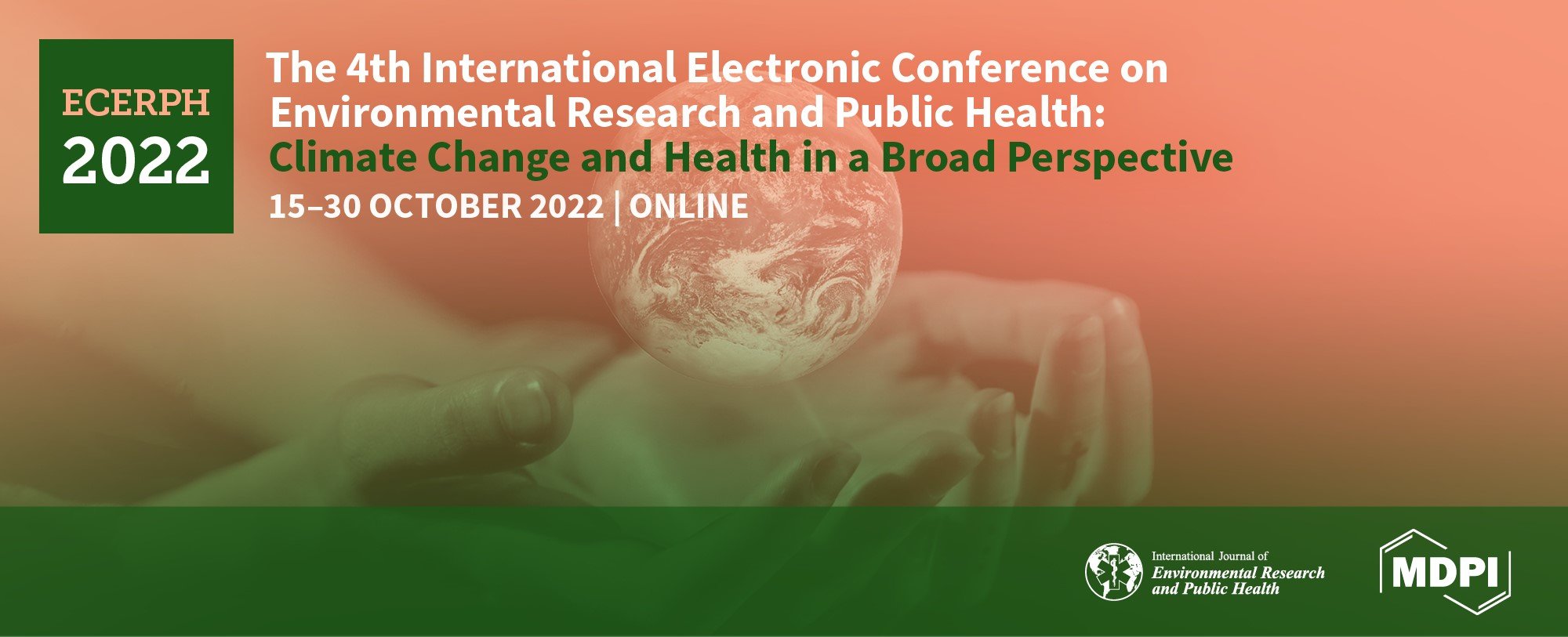
We cordially invite you to participate in the 4th International Electronic Conference on Environmental Research and Public Health (ECERPH2022), which will be held from 15 to 30 October 2022. Prof. Dr. Jon Øyvind Odland serves as the chair of this e-conference. He is a Professor of Global Health at NTNU, Norwegian University of Science and Technology, and a specialist in GYN/OB, environmental medicine, and epidemiology. This online event will bring together researchers from all over the world with no concerns regarding travel or other related expenditures.
Health effects could be very different if the world’s temperature increases from 5 to 10 °C compared to an increase from 35 to 40 °C. If we look at the mortality associated with climate change, it is obvious that the burden is higher in tropical areas. However, if we add morbidity and complications for, e.g., reproductive health and pregnancy care, the situation might be very different. The spread of infectious diseases related to vector migration is also a very important topic, as is the situation of environmental exposure to contaminants and occupational health.
This conference will provide leading scientists, working in the environmental research and public health field, with an online platform to share their latest research and engage in exciting discussions.
The main topics and sessions of the conference are:
- Pregnancy, Reproductive Health, and Climate Change;
- Vector Migration from a Climate Perspective;
- COVID-19 from a Climate Perspective;
- The Forgotten Tropical Diseases from a Climate Perspective;
- Cardiovascular Diseases and Climate Change;
- Occupational Health and Temperature Change.
The conference will be completely free of charge to attend, as well as for scholars to upload and present their latest work on the conference platform.
The accepted proceedings papers from the conference will most likely be published in a dedicated issue of the MDPI journal Environmental Sciences Proceedings (ISSN: 2673-4931). Please note that, before publication, Proceedings Series Journals will review accepted papers using the powerful text comparison tool iThenticate. This procedure aims to prevent scholarly and professional plagiarism. Articles with a high repetition rate and lack of novelty will not be published in the conference proceedings. In addition, all participants will be encouraged to submit an extended full manuscript to one dedicated Special Issue in IJERPH (ISSN 1660-4601) with a 15% discount on the article processing charge (APC, the original APC is CHF 2500).
Important Dates:
- Abstract Submission Deadline: 10 July 2022;
- Notification of Acceptance: 31 July 2022;
- Full Paper Submission Deadline: 28 August 2022;
- Conference Date: 15–30 October 2022.
IJERPH is indexed in Scopus, SCIE (IF = 3.390), SSCI (Web of Science), PubMed, MEDLINE, PMC, and many other databases. Please visit the following website for more information: https://www.mdpi.com/journal/ijerph.
Event Awards
In recognition of the support of the conference’s esteemed authors and their outstanding scientific accomplishments, we are pleased to announce that the conference will provide one Best Paper Award and one Best Presentation Award.
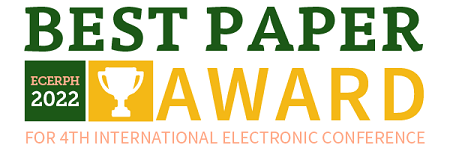
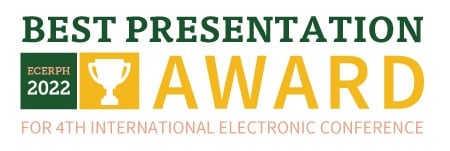
For more information on ECERPH 2022, please visit the conference website (https://sciforum.net/event/ECERPH-4) or contact us by email (ecerph-4@mdpi.com).
Please do not hesitate to contact us if you have any questions and we look forward to welcoming you to this exciting online meeting.
Conference Secretariat
21 December 2021
Recruiting Section Editors-in-Chief for Atmosphere
We encourage applications from researchers with a background in the subject areas covered by the following Sections: “Air Pollution Control” (https://www.mdpi.com/journal/atmosphere/sections/air_pollution_control), “Atmospheric Techniques, Instruments, and Modeling” (https://www.mdpi.com/journal/atmosphere/sections/atmospheric_techniques_instruments_modeling), and “Planetary Atmospheres” (https://www.mdpi.com/journal/atmosphere/sections/planetary_atmospheres).
Should you decide to serve as the Section Editor-in-Chief, you would be responsible for some of the following tasks depending on your availability:
- Defining the aims and scope of the Section;
- Advising on the strategic development of the Section;
- Providing support and guidance to Editorial Board Members and editorial staff when required;
- Maintaining oversight of the editorial process to ensure the quality of the published content and discussing possible improvements;
- Suggesting themes/subjects for Special Issues and assisting in inviting Guest Editors to lead them;
- Inviting distinguished scientists to join the Editorial Board;
- Performing pre-checks of new manuscripts, final decisions after peer-review, and revisions when requested;
- Acting as an ambassador for the journal, MDPI, and Open Access publishing.
The Section Editor-in-Chief position is honorary, and MDPI will support the Section Editor-in-Chief with an annual honorarium in the amount of CHF 3000 (including any expenses and VAT, if applicable). Additionally, MDPI offers the Section Editor-in-Chief the possibility to publish up to two papers per year free of charge in any MDPI journal, and the opportunity to invite up to three distinguished authors per year to submit articles to Atmosphere to be published free of charge, if accepted after peer-review.
Atmosphere (ISSN: 2073-4433) is an international, peer-reviewed, open access journal of scientific studies related to the atmosphere, published monthly online by MDPI. The journal is included in the Science Citation Index Expanded (SCIE) and Scopus, and our 2020 Impact Factor is 2.686.
We believe that your expertise, together with our rigorous editorial policies, can build a high-standard journal. If you are interested in becoming a Section Editor-in-Chief for Atmosphere, please send your full academic CV and a short cover letter that details your interest and enthusiasm for the position to the Editorial Office (atmosphere@mdpi.com).
16 December 2021
Atmosphere | Best Oral Presentation Award from the 2021 Science and Technology Annual Meeting of Chinese Society for Environmental Sciences—Winners Announced
The 2021 Science and Technology Annual Meeting of the Chinese Society for Environmental Sciences was held in Tianjin from 19 to 21 October, 2021. A total of 26 sessions were set up for this conference, mainly focusing on the in-depth creation of the blue sky, clear water, pure land defense, ecological environmental protection and restoration, basic environmental management and scientific research, and actively built an "industry-university-research" exchange platform.
Atmosphere (ISSN: 2073-4433) sponsored this conference, of which the topic was "Atmospheric Deposition and Ecological Environment Effects", hosted by Prof. Dr. Xuejun Liu, Dr. Yuepeng Pan, and Dr. Lin Zhang. In order to thank scholars for their support and contribution of high-quality reports, and to commend their outstanding scientific research achievements, the Atmosphere Editorial Office has set up the Best Oral Presentation Award for this session and selected four outstanding reports. The reports are from the following scholars:
- Dr. Baojing Gu, Zhejiang University;
- Dr. Yu Zhao, Nanjing University;
- Dr. Yu Song, Peking University;
- Enzai Du, Beijing Normal University.
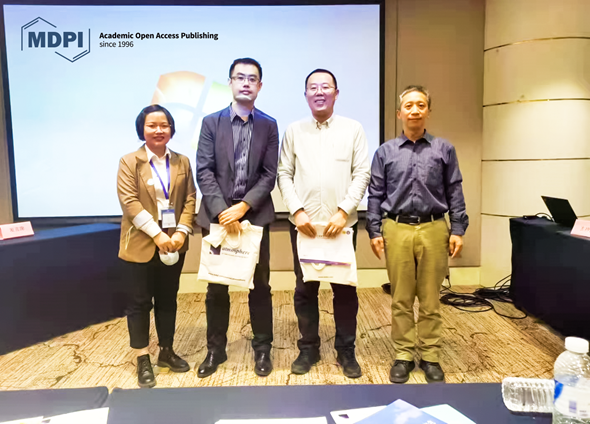
From left to right: Atmosphere Managing Editor, Yafang Wang; Prof. Dr. Yu Zhao from Peking University; Dr. Enzai Du from Beijing Normal University; Prof. Dr. Xuejun Liu from China Agricultural University, Associate Editor of Atmosphere.
Winners

Prof. Dr. Baojing Gu
Prof. Dr. Baojing Gu is a researcher of the "Hundred Talents Program" of Zhejiang University, and the winner of the Zhejiang Outstanding Youth Fund and National Outstanding Youth Fund. He is mainly engaged in cross-research in the field of resource and environmental management, and has achieved relevant research results in the construction of large-scale nitrogen cycle models, resource and environmental effect assessment, cost-benefit analysis, and management regulation. He has published more than 90 papers, of which more than 70 are included in SCI/SSCI, including papers published in renowned journals, as the first/corresponding author. He has presided over a number of scientific research projects, such as the National Natural Science Foundation, the Provincial Outstanding Youth Fund, the National Key Research and Development Program, the United Nations Environment Program Fund, and the British Newton Fund. He has served as a fund review expert in China, Sweden, Australia, and other countries; he is a member of the International Nitrogen Promotion Association (INI) Asian Working Committee; he is a research team leader of the International Nitrogen Management System (INMS); and he is a member of the Nitrogen Working Group of the Chinese Soil Society.

Prof. Dr. Yu Zhao
Prof. Dr. Yu Zhao is a professor and doctoral supervisor at the Nanjing University. He is the National Excellent Doctoral Dissertation Winner, selected by the Ministry of Organizations Ten Thousand Talents Program-Young Top Talent Support Program, New Century Excellent Talent Support Program of the Ministry of Education, Jiangsu Innovation and Entrepreneurship High-Level Talent Introduction Program, National Natural Science Foundation of China Excellent Youth Science Fund, and Jiangsu Provincial Natural Science Foundation of China Outstanding Youth Science Foundation, and the winner of the 4th Chinese Society of Environmental Sciences Young Scientist Gold Award. His main research direction is environmental atmospheric science, focusing on research on the sources of atmospheric pollutants and their typical environmental effects.

Prof. Dr. Yu Song
As a professor at the School of Environment, Peking University, Prof. Dr. Yu Song has been engaged in atmospheric environment simulation research. His research interests include numerical calculations of atmospheric boundary layer processes and atmospheric chemistry mechanisms, coupled simulations of atmospheric pollution and ecosystems, and agricultural source emissions of atmospheric pollution. He has published nearly 150 academic papers, including PNAS, which have been cited 6600 times, with a H-Index index of 40.

Dr. Enzai Du
Dr. Enzai Du is an associate professor at the School of Natural Resources, Faculty of Geographical Sciences, Beijing Normal University, and a Young Changjiang Scholar of the Ministry of Education. His research directions are biogeochemistry and forest ecology, with particular attention to the changes in the geographic pattern of key element biogeochemical processes and their ecological environmental effects, and he is committed to revealing the key ecological processes of forest ecosystems against the background of global changes, especially the large-scale law of element cycles, to provide theoretical and strategic support for the protection of ecological resources at regional, national, and global scales; the realization of the "carbon neutral" goal; and the construction of green infrastructure. His research group has been committed to the following research directions for many years: the temporal and spatial laws of atmospheric deposition of key elements and their ecological effects; the temporal and spatial dynamics of terrestrial vegetation productivity nitrogen and phosphorus limitations and their driving mechanisms; the impact of global changes on the northern coniferous forest ecosystem and its mechanisms; urban forest biogeochemical cycle pattern and mechanism; plant diversity geographic pattern and protection design.
Related Special Issue:
“Agricultural Ammonia Emission and Mitigation Effects”
https://www.mdpi.com/journal/atmosphere/special_issues/agricultural_ammonia
Guest Editors: Xuejun Liu, Baojing Gu and Lin Zhang
Submission Deadline: 30 June 2022
22 November 2021
722 MDPI Editorial Board Members Receiving "2021 Highly Cited Researchers" Distinction
It is our great honor to congratulate the Editorial Board Members and Editors in MDPI's journals who have been distinguished as 2021 Highly Cited Researchers by Clarivate, according to Web of Science data. We herewith express our gratitude for the immense impact the named researchers continue to make on scientific progress and on our journals' development.
Clarivate's annual list of Highly Cited ResearchersTM identifies the most highly cited scientists for the past decade. Their impactful papers are among the top 1 per cent in the citation distribution of one or more of 22 fields analyzed in the "Essential Science Indicators", distinguishing them as hugely influential among their peers.
| Abate, Antonio Abatzoglou, John T. Abbaszadeh, Mostafa Acharya, U. Rajendra Acharya, Viral V. Agarwal, Ravi P. Ahn, Myung-Ju Airoldi, Laura Ali, Imran Allakhverdiev, Suleyman I. Aluko, Rotimi E. Anasori, Babak Andersson, Dan I. Andes, David Anker, Stefan D. Apergis, Nicholas Ariga, Katsuhiko Arqub, Omar Abu Aschner, Michael Assaraf, Yehuda G. Astruc, Didier Atala, Anthony Atanasov, Atanas G. Atangana, Abdon Bahram, Mohammad Bakris, George L. Balandin, Alexander A. Baleanu, Dumitru Balsamo, Gianpaolo Bando, Yoshio Banks, William A. Bansal-Travers, Maansi Barba, Francisco J. Barros, Lillian Basit, Abdul W. Baskonus, Haci Mehmet Bassetti, Matteo Battino, Maurizio Bell, Jordana T. Bellomo, Nicola Benediktsson, Jon Atli Benelli, Giovanni Benjakul, Soottawat Bhatnagar, Amit Biddle, Stuart J. H. Biondi, Antonio Biondi-Zoccai, Giuseppe Bjarnsholt, Thomas Blaabjerg, Frede Blaschke, Thomas Blay, Jean-Yves Blumwald, Eduardo Blunt, John W. Boffetta, Paolo Bogers, Marcel Bonomo, Robert A. Bowman, David M.J.S. Boyer, Cyrille Brestic, Marian Brevik, Eric C. Buhalis, Dimitrios Burdick, Jason A. Byrd, John C. Cabeza, Luisa F. Cai, Xingjuan Cai, Jianchao Calhoun, Vince D. Calin, George Cao, Jinde Cao, Guozhong Carvalho, Andre F. Castellanos-Gomez, Andres Cerqueira, Miguel Ângelo Parente Ribeiro Chang, Jo-Shu Chang, Chih-Hao Chastin, Sebastien Chau, Kwok-wing Chemat, Farid Chen, Xiaobo Chen, YangQuan Chen, Jianmin Chen, Chaoji Chen, Min Chen, Qi Chen, Jun Chen, Xi Chen, Peng Chen, Yulin Chen, Bo Chen, Chen Chen, Zhi-Gang Chen, Wei-Hsin Chen, Gang Chen, Yongsheng Chen, Xiang Chen, Yimin Chen, Runsheng Chen, Lidong Chen, Shaowei Chen, Qian Chen, Yu Chen, Shuangming Chiclana, Francisco Cho, Sun Young Choi, Wonyong Chowdhary, Anuradha Choyke, Peter L. Cichocki, Andrzej Corella, Dolores Corma, Avelino Cortes, Javier Cortes, Jorge Costanza, Robert Crommie, Michael F. Cui, Yi Cui, Haiying Cui, Qinghua Cummings, Kenneth Michael Dai, Shifeng Dai, Sheng Daiber, Andreas Davis, Steven J. Dawson, Ted M. de la Fuente-Nunez, Cesar Decker, Eric Andrew Dekel, Avishai Demaria, Marco Deng, Yong Deng, Xiangzheng DePinho, Ronald A. Desneux, Nicolas Dimopoulos, Meletios-Athanasios Ding, Aijun Dionysiou, Dionysios D. Dokmeci, Mehmet Remzi Dolgui, Alexandre Dong, Fan Dou, Shi Xue Dou, Letian Du, Qian Du, Bo Dube, Shanta Rishi Dufresne, Alain Dummer, Reinhard Dupont, Didier Edwards, David Elaissari, Abdelhamid Elhoseny, Mohamed Ellahi, Rahmat Ellis, Erle C. ElMasry, Gamal Esteller, Manel Estévez, Mario Fabbro, Doriano Facchetti, Antonio Fan, Zhanxi Fang, Chuanglin Fasano, Alessio Fečkan, Michal Felser, Claudia Feng, Liangzhu Fensholt, Rasmus Ferdinandy, Péter Fernandez-Lafuente, Roberto Ferreira, Isabel C. F. R. Filippi, Massimo Fisher, Helen Fortino, Giancarlo Fosso Wamba, Samuel Franceschi, Claudio Fujita, Hamido Fujita, Masayuki Gai, Francesco Gaisford, Simon Galanakis, Charis M. Galluzzi, Lorenzo Galvano, Fabio Gan, Ren-You Gan, Lihua Gandomi, Amir H. Gao, Bin Gao, Feng Gao, Minrui Gao, Huijun Gao, Wei Gao, Huile Garbe, Claus Garcia, Hermenegildo Gasbarrini, Antonio Gasco, Laura Gautret, Philippe Geng, Yong Gerdts, Gunnar Geschwind, Daniel H. Ghadimi, Noradin Ghaffari, Roozbeh Ghamisi, Pedram Giampieri, Francesca Glick, Bernard R. Gnant, Michael Goel, Ajay Gogotsi, Yury Goldewijk, Kees Klein Gong, Jinlong Gong, Yongji Govindan, Kannan Granato, Daniel Grancini, Giulia Green, Douglas R. Grosso, Giuseppe Gu, Ke Guan, Cao Guastella, Adam J. Guerrero, Josep M. Gui, Guan Guizani, Mohsen Guo, Zaiping Gupta, Rangan Gutzmer, Ralf Haase, Dagmar Habibi-Yangjeh, Aziz Hagemann, Stefan Hagger, Martin Hamblin, Michael R. Hammoudeh, Shawkat Han, Heesup Hanes, Justin Harrison, Roy M. Hartung, Hans-Peter Hasanuzzaman, Mirza He, Jr-Hau He, Hongwen He, Jiaqing He, Debiao Henseler, Jörg Herrera, Francisco Herrera-Viedma, Enrique Hetz, Claudio Ho Kim, Jung Holmes, Elaine Hossain, Ekram Hsueh, Po-Ren Hu, Xiaosong Hu, Wenbin Huang, Jianping Huang, Hongwei Huang, Yu Huang, Jianying Huang, Peng Huang, Baibiao Huang, Shaoming Hubacek, Klaus |
Iqbal, Hafiz M. N. |
Saad, Fred |
The full list of 2021 Highly Cited Researchers can be accessed at the following webpage in the Web of ScienceTM https://recognition.webofscience.com/awards/highly-cited/2021/.
--- Highly Cited Researchers (HCR) is a Clarivate product.
16 November 2021
Topical Advisory Panel Established to Support Editorial Board
Academic editors play a crucial role in leading our journals and ensuring that each article undergoes a robust and timely peer-review. With the launch of Topics this year and addition of Topic Editors to our family of academic editors, we decided it would be a good time to restructure our academic boards, thus providing more clarity and support for each role. MDPI is pleased to announce the launch of a new position—Topical Advisory Panel Member, that will replace the previous position of Topics Board Member. The Topical Advisory Panel will be comprised of early career researchers eager to gain experience in editorial work.
The main responsibility of the new members of the Topical Advisory Panel is to regularly provide support to Guest Editors, Topic Editors, and Section Board Members. The responsibilities of the Topical Advisory Panel are available here: https://www.mdpi.com/editors.
Each year, the members’ performances are evaluated, and outstanding members are promoted to the Editorial Board by the Editor-in-Chief.
To qualify as a Topical Advisory Panel Member, applicants must:
- Have expertise and experience in the field related to the journal;
- Have received a Ph.D. in the last 10 years, approximately;
- Have at least 6-8 published papers in the last 5 years as first author or corresponding author;
- Currently hold an independent research position in academia or a government institute.
If you are interested in this role, please contact the editorial office by email.
We look forward to hearing from you soon.
25 October 2021
Open Access Week 2021 | It Matters How We Open Knowledge: Building Structural Equity, 25–31 October

Founded in 1996, MDPI was one of the first fully Open Access publisher. Over 25 years MDPI has grown to become the largest Open Access publisher globally, publishing over 160,000 articles across more than 350 journals in 2020. At the core, MDPI was founded in response to a pressing need of fast publication and inclusion. The scholar was set at the centre of the publication process for the first time. Acting as a service provider, rather than a product provider, MDPI exists to help scientists achive their objective to disseminate research results. At MDPI, we believe scientists deserve a better service from the publishing world.
The International Open Access Week (Open Access Week), founded by the SPARC (the Scholarly Publishing and Academic Resources Coalition) Alliance and student partners in 2008, has been successfully running for 13 years. As an advocate and pioneer of open access publishing, MDPI actively responds to the call of International Open Access Week. This year’s theme of “It Matters How We Open Knowledge: Building Structural Equity” highlights the Recommendation’s call for equitable participation from all authors and readers.
For the last 25 years, MDPI has been committed to disseminating open research. Here is a video showing MDPI’s Commitment to Equity, Inclusion and Diversity for More than 25 Years.
International Open Access Week is an important opportunity to catalyze new conversations, create connections across and between communities that can facilitate this co-design, and advance progress in the building of more equitable foundations for opening knowledge—discussions and actions that need to be continued, year in and year out. MDPI has always aimed to provide professional and efficient publishing services to scholars around the world.
Our mission is to make scientific research accessible to everyone; this year, we interview and hold discussions with open science ambassadors on how to build an equal and inclusive environment for open science. Academic editors help us collaborate with more institutions to advocate for open access ideas.
Besides this, our scientific community is a key driver of our success and MDPI’s remarkable growth. Despite the pandemic, we have prepared online conferences and workshops to gather scholars from different communities.
The Basel Sustainable Publishing online forum provides an equal opportunity for stakeholders and researchers from multi-cultural environments to exchange ideas and eliminate barriers to participation.
Conference date: 25 October 2021, online
Conference website: https://bspf2021.sciforum.net/
Main topics: MDPI discusses the current dilemma of open access science from various perspectives such as governments, libraries, and publishers, and related measures on how to change the status quo of discrimination from a global perspective.
We aim to support equality, inclusion, diversity, and accessibility in scholarly communications. We collaborate with universities and key laboratories and have scholarly communications with researchers, teachers, and students on open access workshops.

- 25 October 2021
Energies journal and Institute of Mechanics, Chinese Academy of Sciences
- 28 October 2021
Machines journal and State Key Laboratory of Traction Power, Southwest Jiaotong University
- 29 October 2021
Processes journal and Beijing Institute of Technology
- 29 October 2021
Coatings journal and Wuhan University of Technology
MDPI is committed to providing open access and high-quality publishing services for scholars and promoting rapid dissemination of academic achievements. We hope to promote the practices and policies of open access publishing and diversify the dissemination of academic achievements.




